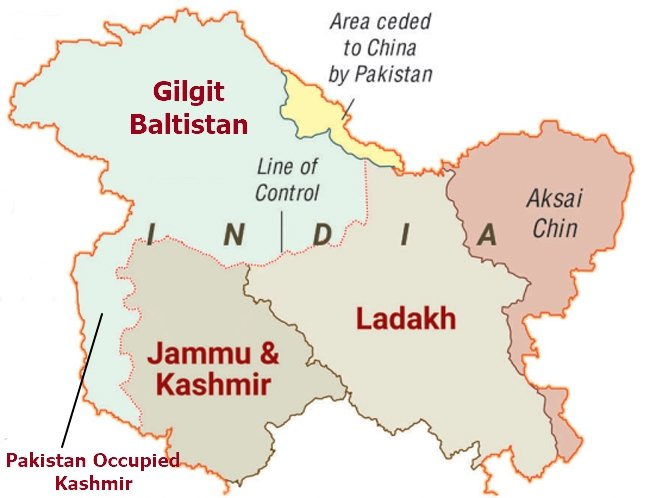Pakistan's Provincial Status to Gilgit-Baltistan | 02 Nov 2020
Why in News
India has strongly rejected Pakistan's move to grant provisional provincial status to Gilgit - Baltistan.
- Gilgit-Baltistan is one of the disputed territories of India.
Key Points
- Gilgit-Baltistan:
- It is a chunk of high-altitude territory located on the north western corner of the Union Territory of Ladakh.
- It is located strategically as it borders Pakistan, Afghanistan and China.
- The region was a part of the erstwhile princely state of Jammu and Kashmir, but has been under Pakistan’s control since 4th November, 1947, following the invasion of Kashmir by tribal militias and the Pakistan army.
- Maharaja Hari Singh, the last Dogra ruler of J&K, had signed the Instrument of Accession with India on 26th October 1947.
- India moved to the United Nations Security Council to raise the issue of Pakistan’s invasion on 1st January 1948.
- The UN Security Council passed a resolution calling for Pakistan to withdraw from all of Jammu and Kashmir and then India had to reduce its forces to the minimum level following which a plebiscite would be held to ascertain people’s wishes.
- However, no withdrawal was ever carried out and it remains a point of contention between two countries.
- Background:
- Recently, Saudi Arabia, a key ally of Pakistan, had removed Pakistan-occupied-Kashmir and Gilgit-Baltistan from the Pakistan map on its new banknote after India asked it to take “urgent corrective steps” about the “gross misrepresentation”.
- On the first anniversary of the revocation of Jammu and Kashmir’s special status, the Pakistan government had released a new “political map” which included Jammu and Kashmir, Ladakh and parts of western Gujarat as part of its territory.
- Describing it as “political absurdity” and a “ridiculous assertion”, India said it “confirms the reality of Pakistan’s obsession with territorial aggrandisement supported by cross-border terrorism”.
- The Gilgit-Baltistan region is at the centre of USD 65 billion China Pakistan Economic Corridor Infrastructure development plan.
- India's Stand:
- India claims that the entire Jammu and Kashmir and Ladakh including Gilgit-Baltistan is an integral part of India by the virtue of legal, complete and irrevocable accession of Jammu and Kashmir to the union of India in 1947.
- Pakistan’s move to name Gilgit-Baltistan as its fifth province is meant to “camouflage its illegal occupation” of the area but it cannot “hide the grave human rights violations, exploitation and denial of freedom” to the people for over seven decades.

